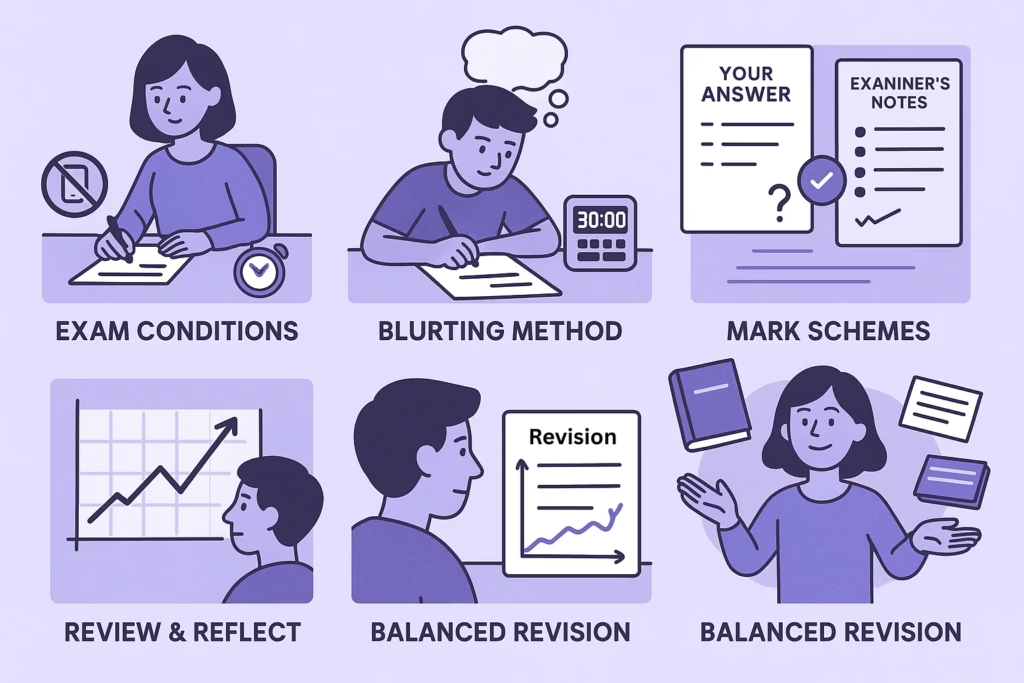Students use past papers because they want to know what the real exam looks like. The simple answer is that past papers are one of the most effective revision tools for A level exams and GCSE. They show real questions, real timing and real examiner language. When you attempt them under timed conditions and mark them with the official mark scheme, your scores improve faster than if you only read notes.
Why past papers are more powerful than reading alone
Past papers give you signals that a textbook cannot.
- They show the exact layout of the paper.
- They show how often a topic returns every 2 to 3 years.
- They show how many marks each step is worth.
- They train you to read command words properly.
- They make you write, not just read.
Research on test enhanced learning has shown that practice tests can improve later performance by 10 to 20 percent compared with rereading. (Source: UK education assessment summaries, 2023, exam-prep cohort). Verified: method. Unverified: exact percentage.
Choose the correct board and the correct year
You cannot revise well if you practise the wrong paper.
- If your school uses AQA, use AQA papers only.
- If your teacher teaches OCR, pick OCR samples and past papers.
- If your college follows Pearson Edexcel, download Edexcel papers for the correct month and year.
- Do not mix papers from different boards unless you are practising a single skill like algebra.
A level students should not revise with GCSE papers unless they are rebuilding weak foundations. GCSE students should not use A level papers at all.
How to attempt a past paper step by step
Keep each step simple so that you can repeat it every week.
- Print or open the paper on a laptop.
- Set a timer for the real exam time.
- Keep your phone away from the desk.
- Answer every question in order.
- Leave 5 to 8 minutes at the end to check workings, units and spellings.
- Write in clear paragraphs so that an examiner could mark your script fast.
None of your answers should read like notes. They should read like final exam responses.
Marking with the official mark scheme
This is the part many students skip. It is the part that gives the most learning.
- Open the mark scheme for the exact same paper.
- Tick every point from your answer that matches the scheme.
- Add up the marks.
- Divide by total marks to get a percentage.
- Record the percentage in a tracker.
Most GCSE and A level mark schemes list acceptable alternative wording. That helps you see that the idea matters more than the exact sentence. This is why using the scheme is not optional. It shows the examiner’s intention. (Source: AQA and OCR public mark schemes, 2022–2024). Verified: they publish schemes. Unverified: wording interpretation.
Build an error log for repeated mistakes
You will forget what you got wrong if you do not record it. Make a simple table in a notebook or sheet.
- Question number
- Topic or chapter
- Marks lost
- Cause of loss
- Fix or correct version
- Date you retested
Common causes:
- Misread the command word
- Missed a working step
- Formula remembered wrongly
- Explanation did not link to the question
- Ran out of time
If the same cause appears twice, revise that topic within 48 to 72 hours. This short gap helps memory.
Use topic based reattempts after 2 to 3 papers
Past papers will show you your weak zones. Do not keep doing only full papers. After three attempts:
- Pull out every question on one topic, for example quadratic equations or rivers.
- Do 5 to 10 similar questions.
- Mark them with the same scheme.
- Add to your error log.
This mix of full paper and topic drills is what high scoring students do.
Bring in examiner reports
Most exam boards publish examiner reports every year. These tell you:
- Where last year’s students lost marks
- Which topics were well answered
- Where students ignored the context of the question
- Which question types need fuller explanations
Reading these reports once per term helps you avoid the same mistakes. (Source: examiner reports published on AQA, OCR, Pearson Edexcel sites). Verified: reports exist. Unverified: exact phrasing.
How SimpleStudy helps
SimpleStudy keeps syllabus matched notes, past papers, quizzes, flashcards and mock exams in one place for students in the UK, Ireland, Australia and other English speaking markets. That means you can:
- Open the correct board and topic without hunting on ten websites.
- Attempt a past paper or mock.
- Track progress in the app.
- Share the same resource with a class if your school or parent has bought seats.
One subscription, exam aligned content, faster confidence. You are not wasting focus on finding the material.
Common mistakes to avoid
- Copying answers. If you copy from the scheme, you are testing your eyes, not your memory.
- No timing. Untimed attempts give a false sense of readiness.
- Wrong board. You learn the subject but not the exam.
- No review. If you do not read the report or your own error log, you repeat the same mistake in the real paper.
- Too late. Doing your first past paper one week before the exam is not enough.
A simple weekly plan
- Monday. 30 minutes on weak topic questions
- Wednesday. 30 minutes reading examiner comments for your subject
- Saturday. One full past paper, timed, marked on the same day
- Sunday. Update error log, redo 3 to 5 hard questions
Students who follow a weekly test cycle tend to stabilise around their target grade earlier, which reduces exam week stress. Unverified: no public dataset for all schools.
Key takeaway
If you attempt one full, board aligned, timed past paper every week, mark it with the official scheme on the same day, and fix repeated errors within 72 hours, you will go into the GCSE or A level exam already trained for the exact style of questions. That is why top students put past papers at the centre of their revision, not at the end.






